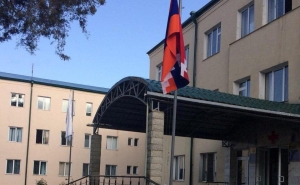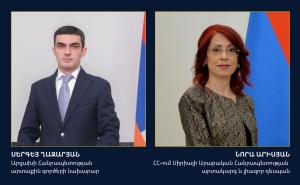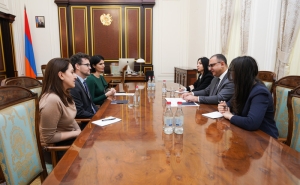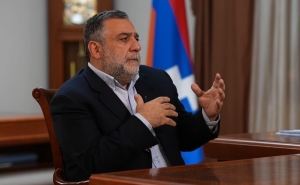Trilateral Ceasefire Agreement Signed Between NKR, Armenia and Azerbaijan: 26 Years Have Passed
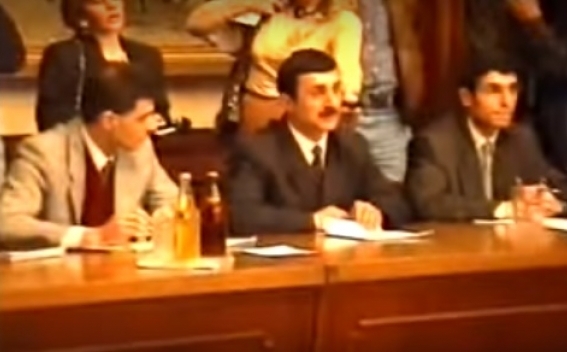
Today, on May 12, 26 years have passed since the Ceasefire Agreement in Karabakh conflict zone entered into force. Exactly 26 years ago large-scale military actions in Karabakh were stopped, but peace - in the full sense of the word - has not come yet... April four-day war showed how fragile the Agreement on Ceasefire is and how easy it is to break it. Until now, on NKR-Azerbaijan border and on Armenia-Azerbaijan border people are dying, and if we summarize the number of deaths on the front lines, say, a year, it will be difficult to confirm that there is a ceasefire.
Info:
The Ceasefire document, which is signed at that time by the Minister of Defense of Armenia Serzh Sargsyan, Nagorno Karabakh Army Commander Samvel Babayan and the Minister of Defense of Azerbaijan Mamedrafi Mamedov, as it is put on the official website of NKR Foreign Ministry, reads as follows:
"Responding to the call for a cease-fire, as set out in the Bishkek Protocol of May 5, 1994, and based on the Protocol of 18 February 1994, the conflicting Parties agreed on the following:
- Ensure the full cease-fire and cessation of hostilities from 00 hours 01 minutes of May 12, 1994. Relevant orders to cease-fire will be given and communicated to the commanders of military units responsible for their implementation, not later than May 11, 1994. On May 12 until 23.00, the Parties shall exchange the texts of their cease-fire orders with a view to their possible mutual complementarities and further harmonization of substantive provisions of similar documents.
- Request the Minister of Defense of the Russian Federation to convene in Moscow no later than May 12 an urgent meeting of defense ministers of Azerbaijan, Armenia and Nagorno Karabakh army commander to agree on the lines of troops pullback and other urgent military-technical issues and prepare the deployment of an advance team of international observers.
- This agreement will be used to complete the negotiations in the next 10 days and conclude an Agreement on Cessation of the Armed Conflict no later than May 22 of this year.
- This agreement will take effect immediately after the Mediator notifies that he has received from the opposing forces completely identical documents signed by authorized representatives."
Vladimir Kazimirov, who from 1992 to 1996 was the head of Russia’s intermediary mission on Karabakh settlement, representative of the President of Russian Federation on Nagorno Karabakh issue and also participant and co-chairman of the OSCE Minsk group from Russia, wrote: "It seemed the way to the agreement was open. But even a trifle could destroy everything. The Azerbaijani leadership wanted to sign a ceasfire with Armenia. The latter, however, did not want this without the participation of Stepanakert. To exclude their representatives meant to save time and lose the chance to change the situation on the frontline. It was only left to get around the whims of the parties and sign the document in any suitable form."
The text of the Agreement had to be out in 3 different pages for the three sides to sign it. The Azerbaijani Defense Minister Mamedrafi Mamedov signed the sheet on May 9, 1994 in Baku in the presence of the Russian mediator. On May 10 the second sheet was signed on Yerevan by his counterpart Serzh Sargsyan and on May 11 the third one - in Stepanakert, by Nagorno Karabakh Army Commander Samvel Babayan. These three sheets signed by three sides separately, were put together in Moscow, and became a ceasefire agreement of Nagorno-Karabakh. Russia, as a mediator, decalred the Ceasefire to enter into force on May 12.
Masis Mailyan, now head of the Public Council on Foreign Policy and Security of NKR, writes: "As an eyewitness and one of the participants in the negotiations that took place during the war and postwar years, I can state that in the 1992-1993 ceasefire in the zone of Karabakh conflict was declared up to ten times: as the signatories of the agreement were the two main warring parties - the NKR and Azerbaijan. However, unlike the ceasefire agreement, signed on May 12, 1994, the previous agreements had short life. The basis for the formation of the existing truce was put on May 5, 1994 in the capital of Kyrgyzstan, where the heads of the parliaments of the NKR, Azerbaijan and Armenia discussed the situation in the region and adopted the "Bishkek protocol" (the Azerbaijani side joined the protocol three days later, with some reservations). On May 16, 1994 in Moscow with the mediation of the Russian Defense Minister Pavel Grachev a meeting of the Defense Ministers of NKR, Azerbaijan and Armenia was held. At this meeting, Samvel Babayan, Mamedrafi Mammadov and Serzh Sargsyan reiterated the commitment of their countries on the reached Ceasefire Agreement. On July 27 and August 28 of the same year, the parties reaffirmed their commitment to respect the ceasefire, until signing a peace treaty…"
Despite the fact that Azerbaijan dared to resort to blitzkrieg, the losses of Azerbaijan is so touchable that it will remember the four-day war in April for a long time. Meanwhile, Armenia and Karabakh have repeatedly expressed their willingness to strengthen the ceasefire. The most important proof of this is that Armenia and NKR are ready to withdraw snipers from the front line, on what Azerbaijan does not agree.
Whatever we say, the ceasefire, despite the violations and instability, however, 26 years ago brought peace to the region. The bombings, large-scale military actions were stopped and most importantly - psychology of war disappeared. A generation grew, who understands and realizes: a variety of issues and disagreements can be resolved not on the battlefield and with strength, but at the table of negotiations and through dialogue. If we assume that, in addition to peace in the region, this is also considered an achievement of the Ceasefire Agreement, then the signed document of 26 years ago is really priceless. But most importantly, this agreement today can become the basis for large-scale peace treaty, which could bring to the region more stability, long-term and more realized peace...
Other materials on this subject
- Russian forces have clearly failed in their duties: senators press Biden Administration to break Azerbaijan’s blockade The United States cannot stand aside while the Aliyev regime callously threatens the lives of Nagorno-Karabakh’s citizens, and must hold Azerbaijan to account for blocking a civilian population’s access...
- US calls for the full restoration of free movement through the Lachin Corridor "We remain concerned about impeded access to the Lachin Corridor and the humanitarian implications of this situation. This sets back the peace process and undermines international confidence. We call for...
- Azerbaijani forces violate the ceasefire in Artsakh The ceasefire violation was reported to the command of the Russian peacekeeping troops.
- Azerbaijani units violate ceasefire in several directions, Artsakh’s Defense Ministry says The Armenian side has no losses. The incidents of ceasefire violations were reported to the command of the Russian peacekeeping troops.
- Russian Diplomat Reassures Armenians Over Corridor In Karabakh "The parties are in direct contact, and I assure you that the peacekeepers will not move a single centimeter until there is a new corridor," Seleznyov said.
-
 17:08
17:08The regular session of the Anti-corruption Policy Council takes place in Jermuk
-
 15:05
15:05The Prime Minister sends congratulatory messages to the supreme leader of Iran and the President of Iran
-
 11:11
11:11Armenia sends earthquake aid to Turkey
-
 10:43
10:43Commemoration of the Pontiff St. Sahak Partev
-
 09:16
09:16Some roads are closed and difficult to pass in Armenia
-
 19:55
19:55Phone conversation of the Foreign Minister of Armenia with the U.S. Assistant Secretary of State for European and Eurasian Affairs
-
 18:30
18:30Prime Minister Pashinyan and President Khachaturyan meet
-
 18:20
18:20Ararat Mirzoyan with Co-Chairman of the OSCE Minsk Group of France Brice Roquefeuil
-
 17:01
17:01Humans could land on Mars within 10 years, Musk predicts
-
 16:45
16:45France, US urge 'immediate' end to Nagorno Karabakh blockade
-
 16:01
16:01Blockaded Nagorno Karabakh launches fundraiser to support quake-hit Syria
-
 15:59
15:59Earthquake death toll in Turkey rises to 18,342
-
 15:43
15:43Ararat Mirzoyan Held a Telephone Conversation with Sergey Lavrov
-
 15:06
15:06French president rules out fighter jet supplies to Ukraine in near future
-
 14:47
14:475 Day Weather Forecast in Armenia
-
 14:44
14:44President Vahagn Khachaturyan wrote a note in the book of condolences opened in the Embassy of Syria in Armenia
-
 14:20
14:20Azerbaijan’s provocations impede establishment of peace and stability – Armenian FM tells Russian Co-Chair of OSCE MG
-
 12:57
12:57France representation to OSCE: Paris calls on Azerbaijan to restore freedom of movement through Lachin corridor
-
 11:40
11:40Command of Kosovo forces highly appreciated preparation of Armenian peacekeepers
-
 10:16
10:16The United States withdrew from sanctions against Syria for six months the provision of assistance after the earthquake
day
week
month
Humidity: %
Wind: km/h



